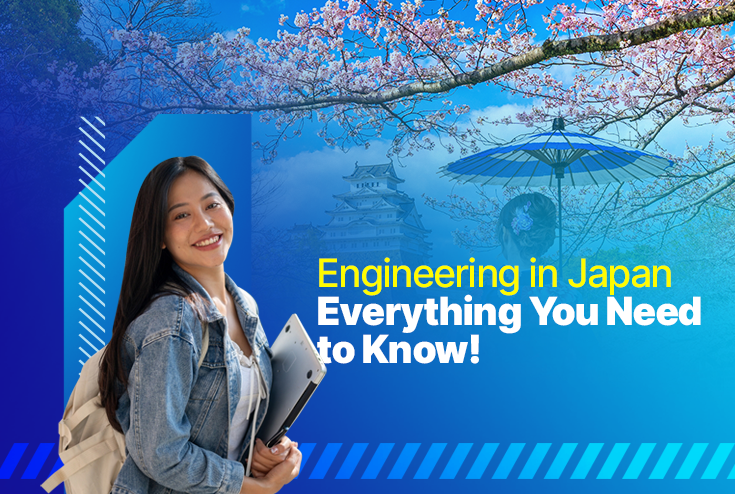.png)

Every year, more than 240,000 international students choose Japan for higher education, and a rising number of them are aspiring engineers. Among them, Nepalese students are increasingly drawn to Japan’s reputation for innovation, safety, and career-ready education. But why engineering?
Because Japan is the world’s third-largest economy, home to tech giants like Toyota, Sony, and Panasonic, and is at the forefront of robotics, AI, automotive design, and precision manufacturing. The country invests heavily in R&D, with over 3% of its GDP going into scientific research, one of the highest in the world.
If you are one of those students with dreams of building cutting-edge systems, working in smart factories, or designing next-gen infrastructure, this blog is your roadmap to Japan.
Stay with us as we unpack the how, why, where, and what next of studying engineering in Japan, specifically for Nepalese students ready to build their future.
Table of Contents
Japan doesn’t just teach engineering. It lives it.
From earthquake-resistant skyscrapers to space satellites, Japan’s engineering achievements shape everyday life. The country offers international students a powerful mix of hands-on learning, technology-driven curriculum, and global recognition.
Here’s what makes studying engineering in Japan worth considering for Nepalese aspirers:
Japan offers a wide spectrum of engineering programs that combine deep academic theory with practical, hands-on experience to prepares students to enter cutting-edge industries straight after graduation.
Here’s an overview of the most in-demand engineering streams in Japan for international students:
Japan’s civil infrastructure is a global benchmark for safety, innovation, and resilience. From the seismic-resistant skyscrapers of Tokyo to the earthquake-proof bullet train tracks that span the country, Japan has engineered its cities to withstand some of the world’s harshest natural disasters.
In 2024, the Japanese government allocated ¥3.7 trillion (approx. USD 25 billion) to infrastructure resilience and development, with a focus on sustainable urban planning, smart transport, and disaster prevention. These national priorities directly support university research and talent development in civil engineering.
Specialisation & Learning Experience
Career Pathways
Why is it popular?
Civil engineering in Japan is not just a degree; it’s an opportunity to participate in a living, evolving ecosystem of innovation. Programs often include field visits, government-backed research projects, and internships with top construction and planning firms.
Best for you if:
You’re someone who wants to build the cities of the future, who is excited by structural safety, sustainability, and solving real-world urban challenges. If your dream is to design buildings that last and protect, this is your path.
Japan has long been a tech powerhouse — home to global leaders in electronics, automation, gaming, and artificial intelligence. While hardware once ruled, today it’s software and digital infrastructure that drive the country’s innovation engine.
According to Japan’s Ministry of Economy, Trade and Industry (METI), there is an expected shortage of 790,000 IT professionals by 2030, particularly in AI, cybersecurity, and data science. This demand is reshaping engineering education across top universities.
Specialisation & Learning Experience
Most programs offer hands-on learning in research labs, and many are taught in English under the Global 30 (G30) initiative or equivalent international pathways.
Career Pathways
Why is it popular?
Japan’s fast-evolving digital ecosystem offers students the chance to contribute directly to smart cities, healthcare AI, fintech, and more. Engineering schools collaborate with major firms like Fujitsu, Rakuten, and SoftBank, bridging academia and industry.
Best for you if:
You’re passionate about creating solutions with code. If you enjoy building digital tools, solving logical puzzles, or imagining how tech can shape society, software engineering in Japan could give you both the education and the platform to grow globally.
As the birthplace of precision manufacturing, robotics, and automation, Japan remains a global authority in mechanical engineering. Its industries are deeply integrated with academia, enabling universities to offer some of the most industry-relevant programs in the world.
From assembling humanoid robots to producing world-class machine tools, Japan leads in research and development. The country spends nearly ¥19 trillion annually on R&D (over 3.5% of its GDP), with a major share directed toward engineering and tech-based innovation.
Specialisation & Learning Experience
Career Pathways
These programs are well-aligned with real-world applications and offer internships or lab-based collaborations with corporations like Mitsubishi, Hitachi, and Yamaha.
Why is it popular?
Mechanical engineering is the backbone of Japan’s global exports, from bullet trains to micro-engines. Its applications are vast, and the education system trains students not just to understand machines, but to reimagine them.
Best for you if:
You’re fascinated by how things move, work, or are built. If you’re someone who wants to engineer new technologies from energy systems to robotic arms and be at the centre of industrial innovation, mechanical engineering in Japan is a smart, future-forward choice.
Japan’s legacy in electrical innovation is legendary. It was the birthplace of Walkman, Blu-ray, and the earliest LED displays. Today, it leads advancements in semiconductors, smart energy grids, autonomous devices, and next-gen communication systems.
In 2023, the Japanese government allocated over ¥1.5 trillion (approx. USD 10 billion) to support its semiconductor strategy, boosting education and R&D in electronic component design, power electronics, and circuit integration. Universities play a key role in executing this national plan.
Specialisation & Learning Experience
Collaborative research with tech labs and electronics giants
Career Pathways
Why is it popular?
This field remains critical to Japan’s leadership in consumer electronics, automotive tech, and smart infrastructure. It also offers diverse job opportunities across sectors.
Best for you if:
You’re curious about how signals travel, how machines communicate, or how devices become “smart.” If you’re interested in engineering future-ready technologies, this field gives you the tools to build and power them.
Japan’s automotive sector is not only one of the biggest in the world, it’s one of the most futuristic as well. Home to brands like Toyota, Honda, Mazda, and Subaru, Japan has pioneered hybrid engines, EVs, and autonomous driving technologies.
In fact, Japan ranks #1 in automobile innovation globally (World Economic Forum, 2024), and exports over 3.7 million vehicles annually. Universities often work directly with manufacturers to develop new components, mobility systems, and sustainability solutions.
Specialisation & Learning Experience
Projects in partnership with automakers (Toyota, Honda, etc.)
Career Pathways
Technical expert in regulatory or innovation-focused automotive roles
Why is it popular?
Japan offers access to live industrial labs, research centers funded by top carmakers, and job pipelines through industry-academia cooperation.
Best for you if:
You’ve always been fascinated by cars - not just driving them, but understanding how they’re built, optimized, and made smarter. If your ambition lies in transforming mobility, Japan’s automotive programs are your perfect ignition point.
With one of the world’s most rapidly aging populations, Japan is investing heavily in healthcare technology, rehabilitation devices, and biosignal processing. Biomedical engineering lies at the center of this transformation, where science, medicine, and innovation converge.
In 2024, Japan’s Ministry of Health and METI jointly pledged ¥750 billion to boost medical R&D, particularly in robotic surgery, prosthetics, diagnostic imaging, and patient-monitoring AI.
Specialisation & Learning Experience
Career Pathways
Why is it popular?
Biomedical engineering is growing in demand across Japanese research institutes and medical device companies. Universities often run collaborative projects with hospitals and tech startups.
Best for you if:
You want to apply your engineering skills to improve human health. If you see yourself designing life-saving equipment, working with medical AI, or building the future of healthcare, this course offers a fulfilling and impactful path.
International students from Nepal can pursue the following academic programs in their chosen engineering specialisation:
|
Program Level |
Overview |
Typical Duration |
Language Availability |
|---|---|---|---|
|
Bachelor’s Degree |
Covers foundational engineering and applied sciences |
4 years |
English / Japanese |
|
Master’s Degree |
Offers deeper specialisations, hands-on research, and advanced technical training |
2 years |
English / Japanese |
|
Doctoral Degree |
Focuses on advanced, independent research leading to a dissertation. Students contribute original knowledge to their field through in-depth study and experimentation. |
3 years |
English / Japanese |
Many top Japanese universities now offer full engineering degrees in English, especially for international cohorts. These include:
Students don’t need prior Japanese language skills to apply for these programs, although learning Japanese during the course is highly encouraged for better career prospects.
Studying engineering in Japan requires careful planning, especially with entrance exams, documentation, and timelines differing by course level and university type. Below is a structured overview to help you understand how to get started.
|
For a Bachelor’s Degree |
For Master’s and PhD Degrees |
|---|---|
|
Academic Requirements |
|
|
|
|
Language Requirements |
|
|
|
|
Entrance Exams |
Research Supervision (Important) |
|
|
|
Application Documents |
|
|
|
Notes for Nepalese Students:
The cost of studying engineering in Japan varies depending on the university type (national, public, or private), location, and program medium (English or Japanese). Here's a breakdown:
|
University Type |
Annual Tuition |
Admission Fee |
Total (1st Year) |
|---|---|---|---|
|
National Universities |
¥535,800 |
¥282,000 |
~¥817,800 (≈ NPR 730,000) |
|
Public Universities |
¥537,000–¥600,000 |
¥300,000 |
~¥850,000–¥900,000 |
|
Private Universities |
¥800,000–¥1,800,000 |
¥200,000–¥300,000 |
~¥1,000,000–¥2,000,000 |
Engineering programs in private universities can be slightly costlier due to lab and tech facilities.
|
Item |
Monthly Cost |
Annual Estimate |
|---|---|---|
|
Accommodation |
¥25,000–¥50,000 |
¥300,000–¥600,000 |
|
Food & Groceries |
¥20,000–¥30,000 |
¥240,000–¥360,000 |
|
Transport & Others |
¥10,000–¥15,000 |
¥120,000–¥180,000 |
|
Total Living Cost |
~¥600,000–¥1,200,000/year |
Understand the Total Cost of Studying in Japan as a Nepali Student
Japan is home to some of the most respected engineering universities in Asia, many of which offer full-degree programs in English. Here are the top institutions that consistently rank high for engineering education, research, and international opportunities.
|
S.N. |
University |
Key Features |
|---|---|---|
|
Public Universities |
||
|
1 |
The University of Tokyo |
|
|
2 |
Tokyo Institute of Technology (Tokyo Tech) |
|
|
3 |
Kyoto Univeristy |
|
|
4 |
Tokohu University |
|
|
5 |
Kyushu Univeristy |
|
|
Private Universities with Strong English Focus |
||
|
1 |
Waseda University |
|
|
2 |
Keio University |
|
|
3 |
Ritsumeikan University |
|
Japan offers a wide range of government and university-funded scholarships to support international engineering students, both at undergraduate and graduate levels. Most of these cover tuition fees, living costs, and travel expenses.
|
Scholarship Type |
Program Level |
Key Features |
|---|---|---|
|
MEXT Scholarship |
Undergraduate & Postgraduate |
|
|
JASSO Scholarship |
Short-term & Degree-seeking |
|
|
University Scholarships |
Typically for all study levels |
|
|
Other Notable Options |
Master's & PhD |
|
Learn More About Applying for Scholarships in Japan from Nepal
Studying engineering in Japan doesn't just end with graduation. The country’s tech-driven economy, innovation culture, and ageing workforce make it one of the best destinations for international graduates seeking long-term careers.
Japan faces a shortage of skilled engineers, especially in fields like robotics, civil planning, IT, renewable energy, and automotive R&D. As a result, the Japanese government encourages international students with technical degrees to stay and contribute to the workforce.
Top industries hiring engineering graduates include:
Most engineering students find employment through:
After completing your engineering degree in Japan, you can apply for either of the following visas to stay in Japan for longer, begin your job or career, and plan other pathways in future:
1. Work Visa (Engineer / Specialist in Humanities / International Services)
Upon graduation, students can switch to this visa to work full-time in Japan.
2. Highly Skilled Foreign Professional Visa
If you meet the eligibility (salary, academic background, language), this fast-tracks your PR application to as little as 1–3 years.
3. Permanent Residency in Japan
Did you know?
A survey by JASSO revealed that nearly 50% of international engineering graduates in Japan were able to find jobs within 6 months of graduation, especially those with Japanese proficiency (JLPT N2 or higher).
Getting a student visa for Japan is a well-structured process, but it requires early preparation, attention to detail, and timely submissions. Below is a breakdown tailored for Nepalese students planning to study engineering.
1. Secure Admission Offer
2. Apply for Certificate of Eligibility (CoE)
3. Submit Visa Application
After you receive the CoE, submit the following to the Embassy of Japan in Nepal:
Visa processing takes about 5 to 10 working days
4. Prepare for Arrival in Japan
For a more detailed application guide to Japanese university and student visa, visit our dedicated blog: Student Visa for Japan from Nepal
|
Phase |
Ideal Time Frame |
|---|---|
|
University Applications |
Sept to Feb (or earlier) |
|
CoE Application |
Feb to May |
|
Visa Submission |
May to July |
|
Intake |
April or September |
We understand how complicated international education journeys can feel, and that is why we are here to guide you at Asahi International Education. From selecting the right engineering program to handling your entire application-to-arrival process, our team helps you every step of the way.
With us, you get
Studying engineering in Japan is a life-changing decision. And with the right guidance, it doesn’t have to be a complicated one.
Ready to begin your journey?
Let us help you take the first step with confidence. Talk to Our Counsellors Today!
How much percentage is required to study Engineering in Japan from Nepal?
To study engineering in Japan, Nepalese students typically need a minimum of 50-60% marks in +2 (Science stream), especially in Physics, Chemistry, and Mathematics. However, top universities and scholarship programs may require higher scores (around 70% or above). Meeting the academic criteria is essential for eligibility and competitive admission.
Is Japan good for studying engineering?
Yes, Japan is one of the best countries to study engineering due to its advanced technology, world-class universities, and strong industry-academia collaboration. It offers cutting-edge research facilities, practical exposure, and access to global companies in sectors like robotics, automotive, and electronics, making it an ideal destination for engineering students.
Can I go to Japan after 12th?
Yes, Nepalese students can go to Japan after completing +2 (12th grade) to pursue undergraduate engineering degrees. They can apply to Japanese universities offering bachelor’s programs, including those with English-taught engineering courses, and must meet academic and language requirements.
Is engineering in demand in Japan?
Engineering is highly in demand in Japan, especially in fields like software engineering, civil engineering, electrical engineering, and automotive engineering. The country faces a shortage of skilled engineers due to its aging population, creating ample job opportunities for international graduates.
Which engineer is in demand in Japan?
The most in-demand engineers in Japan include:
What is the entrance exam for Japan engineering?
The main entrance exam for international students applying to Japanese universities is the EJU (Examination for Japanese University Admission for International Students). It tests subjects like Mathematics, Physics, Chemistry, and Japanese language. For English-taught programs, universities may conduct their own entrance tests or interviews instead of EJU.
What is the salary of an engineer in Japan per month?
The average monthly salary of an engineer in Japan ranges from ¥300,000 to ¥500,000 (approx. NPR 210,000 to 350,000) depending on experience, specialization, and location. Fresh graduates typically start around ¥300,000, while experienced engineers, especially in IT and automotive sectors, can earn higher salaries.
How many years is engineering in Japan?
A bachelor’s engineering degree in Japan typically takes 4 years to complete. Master’s programs usually last 2 years, while doctoral degrees take an additional 3 years. Some universities also offer accelerated or integrated programs.
How much gap is accepted for study in Japan?
Most Japanese universities accept a study gap of up to 2 years after completing +2 or a bachelor’s degree. However, this varies by institution. A longer gap may require additional explanation, proof of continuous learning, or work experience to strengthen the application.
Also Read
Master’s Degree in Japan for International Students - 2025
Best Consultancy in Nepal for Japan: Your Complete Guide for 2025

Are you dreaming of studying information technology in one of the world's most technologically a...
Read MoreAre you dreaming of pursuing business education in one of the world's most advanced economies? J...
Read More
Japan is increasingly becoming a top destination for higher education among Nepalese students. With...
Read More
For many Nepali students seeking world-class education, cultural richness, and high-tech advancement...
Read More

Begin a transforming journey with Asahi and
Take off with
passion and self-assurance.
ⓒCopyright 2025 Asahi . All rights reserved | Powered By:Communicate